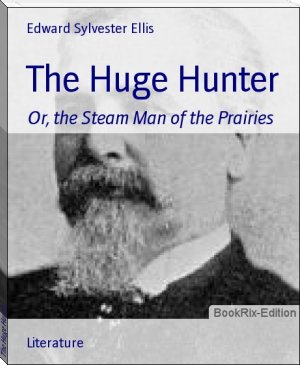The Life of Kit Carson: Hunter, Trapper, Guide, Indian Agent and Colonel U.S.A. by - (best motivational books to read TXT) 📗

- Author: -
Book online «The Life of Kit Carson: Hunter, Trapper, Guide, Indian Agent and Colonel U.S.A. by - (best motivational books to read TXT) 📗». Author -
"At sunset, the temperature was 70 degrees. We had arrived just in time to obtain a meridian altitude of the sun, and other observations were obtained this evening, which placed our camp in latitude 41 degrees 10' 42" and longitude 112 degrees 21' 05" from Greenwich. From a discussion of the barometrical observations made during our stay on the shores of the lake, we have adopted 4,200 feet for its elevation above the Gulf of Mexico. In the first disappointment we felt from the dissipation of our dream of the fertile islands, I called this Disappointment Island.
"Out of the driftwood, we made ourselves pleasant little lodges, open to the water, and, after having kindled large fires to excite the wonder of any straggling savage on the lake shores, lay down, for the first time in a long journey, in perfect security; no one thinking about his arms. The evening was extremely bright and pleasant; but the wind rose during the night, and the waves began to break heavily on the shore, making our island tremble. I had not expected in our inland journey to hear the roar of an ocean surf; and the strangeness of our situation, and the excitement we felt in the associated interests of the place, made this one of the most interesting nights I remember during our long expedition.
"In the morning, the surf was breaking heavily on the shore, and we were up early. The lake was dark and agitated, and we hurried through our scanty breakfast, and embarked—having first filled one of the buckets with water from which it was intended to make salt. The sun had risen by the time we were ready to start; and it was blowing a strong gale of wind, almost directly off the shore, and raising a considerable sea, in which our boat strained very much. It roughened as we got away from the island, and it required all the efforts of the men to make any head against the wind and sea; the gale rising with the sun; and there was danger of being blown into one of the open reaches beyond the island. At the distance of half a mile from the beach, the depth of water was sixteen feet, with a clay bottom; but, as the working of the boat was very severe labor, and during the operation of sounding, it was necessary to cease paddling, during which the boat lost considerable way, I was unwilling to discourage the men, and reluctantly gave up my intention of ascertaining the depth and character of the bed. There was a general shout in the boat when we found ourselves in one fathom, and we soon after landed on a low point of mud, where we unloaded the boat, and carried the baggage to firmer ground."
CHAPTER XXIII. The Return—Suffering for Food—A Royal Feast—On the Lewis Fork—Fort Hall—Division of the Party—Arrival at Dalles—The Sierra Nevada—Preparations for the Passage Through the Mountains—Fremont's Account.
The explorers remained in camp the next day and boiled down some of the water from the lake, thereby obtaining considerable salt. The following morning was clear and beautiful and they returned by the same route, ascending the valley of Bear River toward the north.
The expected Fitzpatrick and the provisions did not show themselves and the party began to suffer for food. When their situation became serious, Fremont permitted a horse to be killed and then all enjoyed one of their old fashioned feasts.
But this supply could not last long, and still they failed to meet their expected friends. After a time they encountered an Indian who had killed an antelope, which they quickly purchased and another feast made every heart glad. By way of dessert, a messenger galloped into camp with the news that Fitzpatrick was close at hand with an abundant supply of provisions.
The next morning the two parties united and continued the journey together. After leaving the Bear River Valley they crossed over to Lewis's Fork of the Columbia. At night the camp fires of the Indian twinkled like so many stars along the mountain side; but they were all friendly and the tired explorers slept peacefully.
Pushing onward they reached the upper waters of Lewis's Fork, where snow began to fall. However, they were quite near Fort Hall and they therefore went into camp, while Fremont rode to the fort and procured several horses and oxen.
The weather continued severe, but Fremont determined to push on, despite the hardships which he knew awaited them all. As a matter of prudence, however, he sent back eleven of his men, leaving about twenty with which he pursued his journey down the river valley in the direction of the Columbia. The Dalles was reached in safety where Kit Carson was left in command of the party, while Fremont with a few companions pushed on to Vancouver Island, where he procured some provisions. On his return, the whole party united and made their way to Klamath Lake, in what was then Oregon Territory. When their observations were completed, they took up their march in the direction of California.
After a long and wearisome journey, attended by much suffering for the lack of food, they came in sight of the Sierra Nevada Mountains, which were seen to be covered with snow. The men were in a sorry plight. The provisions were nearly gone; they could not turn back, and there seemed but two alternatives before them: to push on through the mountains or remain where they were and starve to death. Such men were not the ones to fold their hands and lie down in helpless despair. Accordingly, they made their preparations for the terrible venture.
The snow was so deep that it was impossible to get forward without the aid of snowshoes. Devoting themselves to the manufacture of these indispensable articles, a few were sent ahead to learn how far it was necessary to break a path for the animals. After a laborious passage, it was found that nine miles would have to be prepared in that fashion. Carson was with this advance and when they halted, he saw in the distance the green Sacramento Valley. Although nearly twenty years had passed since he visited that section, he recognized it at once. Away beyond towered the white peaks of the Coast Range. Carson was the only man in the party who really knew where they were.
This passage of Fremont and his men through the Sierra Nevada Mountains is one of the most extraordinary achievements in American history. Carson himself took such a prominent part in it, that it seems only just that Fremont's thrilling account should be quoted.
"The people were unusually silent; for every man knew that our enterprise was hazardous, and the issue doubtful.
"The snow deepened rapidly, and it soon became necessary to break a road. For this service, a party of ten was formed, mounted on the strongest horses; each man in succession opening the road on foot, or on horseback, until himself and his horse became fatigued, when he stepped aside; and, the remaining number passing ahead, he took his station in the rear.
"The camp had been all the day occupied in endeavoring to ascend the hill, but only the best horses had succeeded; the animals, generally, not having sufficient strength to bring themselves up without the packs; and all the line of road between this and the springs was strewed with camp stores and equipage, and horses floundering in snow. I therefore immediately encamped on the





Comments (0)